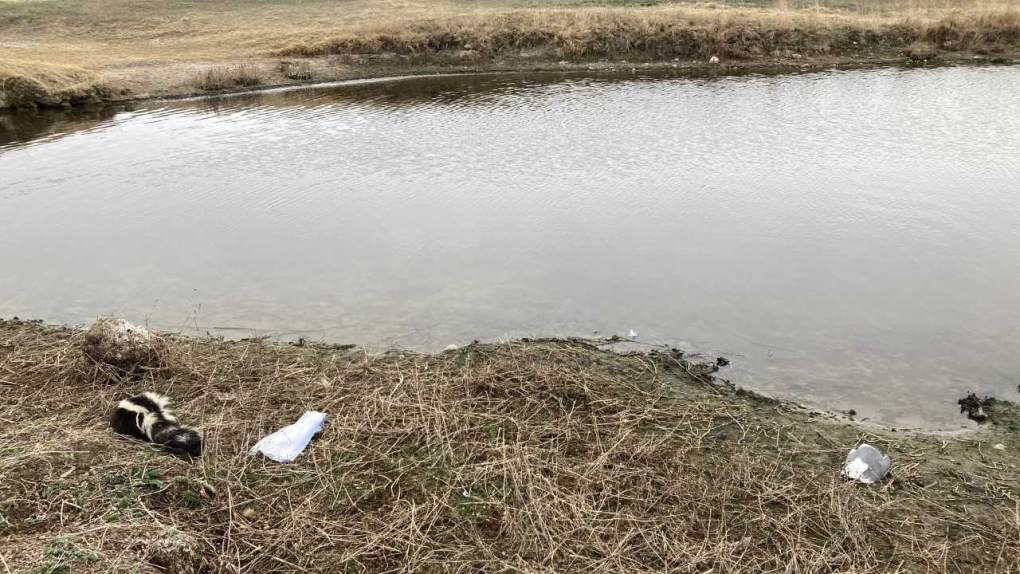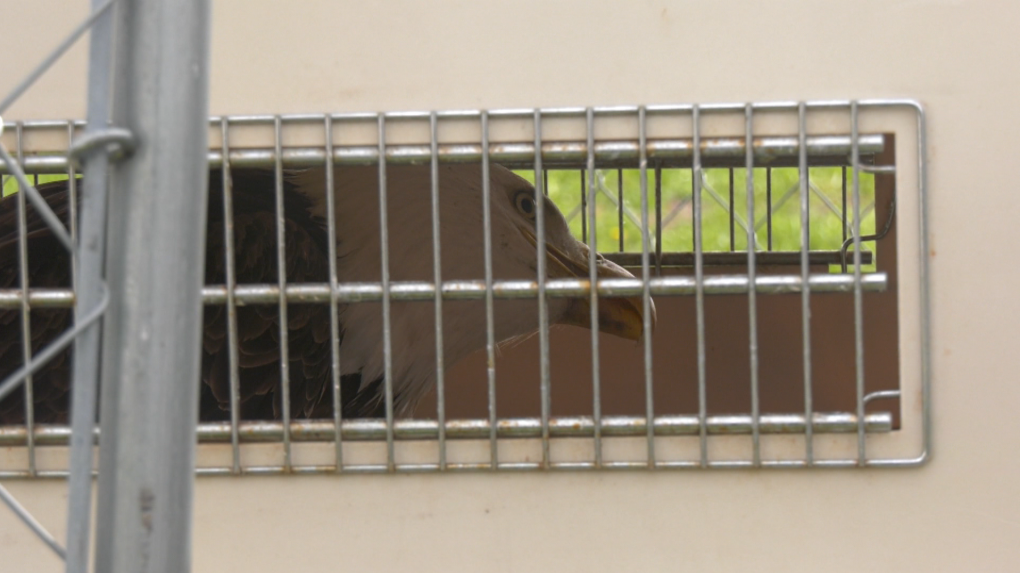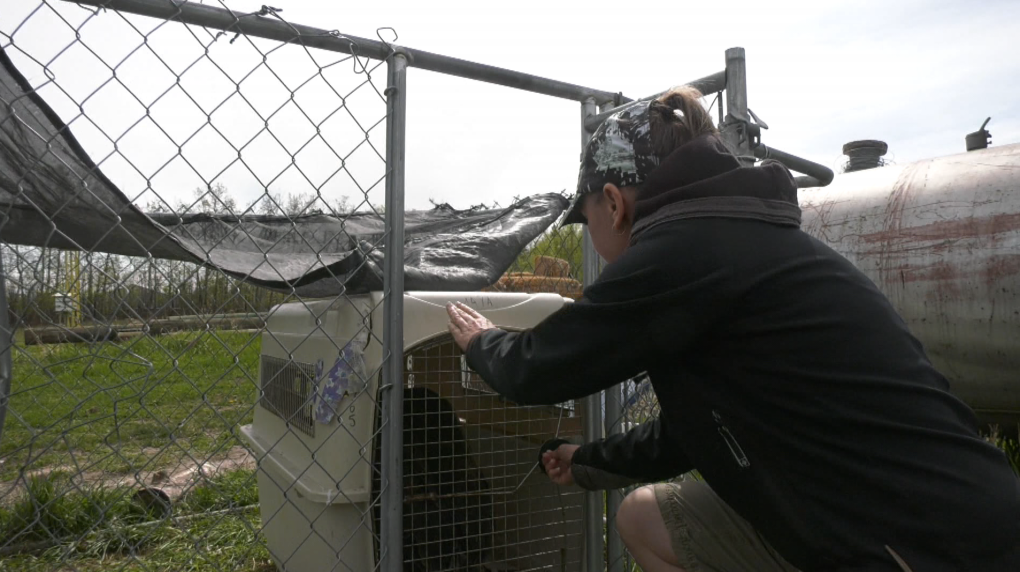Bird flu found in Alberta skunks for first time: experts
Alberta is the latest Canadian province to have found avian influenza, or bird flu, in another species.
Cases of bird flu have been confirmed in skunks in the Vegreville-Wainwright-Lloydminster area in east-central Alberta, according to the province's wildlife disease specialist.
"[Avian influenza] was brought into the province in early April in migrating waterfowl, primarily the geese. As a number of geese died, we started getting reports about a number of dead skunks," Dr. Margo Pybus told CTV News Edmonton.
The skunks tested negative for rabies and positive for bird flu.
They are the only other species so far that Alberta has confirmed had avian influenza, although lab tests are pending for some young foxes, as well.
Ontario, Manitoba and Saskatchewan have all confirmed avian flu cases in foxes, according to Pybus' sources.
 Dead skunks found in east-central Alberta tested positive for avian influenza. (Source: Dr. Margo Pybus).
Dead skunks found in east-central Alberta tested positive for avian influenza. (Source: Dr. Margo Pybus).
She called the recent virus strain – which first showed up in Atlantic Canada in late 2021 – "hotter than usual."
"This is the first time we've seen mortality in wild birds, and it's also the first time we've seen mortality in mammals that are eating the wild birds."
HEAD TILT, SPINNING ARE OBVIOUS SIGNS
Some affected wild birds have turned up at the Strathcona Raptor Shelter, which is run by the Alberta Society for Injured Birds of Prey east of Edmonton.
Roseanna Gullekson, assistant director of the shelter, said it had never been brought a bird flu case before this year.
But since mid-April, the shelter has received seven birds which all displayed the same disconcerting signs of avian influenza: balance issues, spinning, and – the "dead giveaway" – a tilted head.
"The tricky thing is we can't test them until they're dead to confirm whether or not it's bird flu," Gullekson said.
"Anything that comes in with [central nervous system] issues comes in with a story. The red tail hawk that came in first was hit by two cars. So, right off the bat, you know, maybe that's what's causing the head tilt or the balance issues – concussion, right? It's not strange for that. But the spinning in circles is."
On Wednesday, she was caring for a mature bald eagle that was believed to be sick with bird flu. A vet found no signs of trauma. However, its head was almost constantly swivelled, sometimes completely upside down.

There is little recourse if it does have bird flu, so the shelter is keeping him in an animal crate with the hope that the forced rest enables him to recover.
"It's hard to know whether it feels safe, you know," Gullekson said before shrugging. "No predators are going to eat him, free food, breakfast in bed, basically. It could be worse."
The eagle, unlike all of the other probable avian influenza cases the shelter has taken in, had been showing signs of improvement. The mortality rate for avian influenza in raptors is 95 per cent.
"It's pretty bad," Gullekson said.
OUTBREAK BELIEVED TO BE ON DECLINE
Since April 3, Alberta has found 86 probable cases of avian influenza. Most cases have been found in Canadian geese, red-tailed hawks, and great horned owls.
The most severe kind of avian influenza can only be confirmed by the national lab. As of Thursday, the Canadian Food Inspection Agency was tracking 28 "infected premises" in Alberta where either commercial or small flocks (both poultry and other kinds of birds) were sick with highly pathogenic avian influenza (HPAI).
While some strains have the potential to be passed to humans, the Alberta government says there is very low risk to human health and food safety.
Alberta's outbreak is also believed to be on the decline.
"In other places that have already had their outbreaks, when the geese moved off, then the avian influenza seemed to disappear," Pybus told CTV News Edmonton. "Certainly the numbers of dead birds and dead skunks in Alberta has tailed off a little bit in just the last seven to 10 days, so we're thinking that it is on the downward side."
But, she noted, since this is a new version of avian influenza, it's not known what will happen in the fall, when outbreaks are atypical.
"Mother Nature's going to tell us what's going to happen."

While there is low risk to humans, anyone who is handling a dead bird is advised to wear gloves, if handling the animal is unavoidable.
Both Pybus and Gullekson said cleaning up infected carcasses to prevent other animals from eating them is the best course of action.
Agriculture producers are advised to be aware of the early clinical signs, and prevent contact between wild animals and domestic flocks.
More information is available online:
CTVNews.ca Top Stories

Doctors say capital gains tax changes will jeopardize their retirement. Is that true?
The Canadian Medical Association asserts the Liberals' proposed changes to capital gains taxation will put doctors' retirement savings in jeopardy, but some financial experts insist incorporated professionals are not as doomed as they say they are.
Something in the water? Canadian family latest to spot elusive 'Loch Ness Monster'
For centuries, people have wondered what, if anything, might be lurking beneath the surface of Loch Ness in Scotland. When Canadian couple Parry Malm and Shannon Wiseman visited the Scottish highlands earlier this month with their two children, they didn’t expect to become part of the mystery.
Fair in Ontario, flurries in Labrador: Weather systems make for an erratic spring
It's no secret that spring can be a tumultuous time for Canadian weather, and as an unseasonably mild El Nino winter gives way to summer, there's bound to be a few swings in temperature that seem out of the ordinary. From Ontario to the Atlantic, though, this week is about to feel a little erratic.
What do weight loss drugs mean for a diet industry built on eating less and exercising more?
Recent injected drugs like Wegovy and its predecessor, the diabetes medication Ozempic, are reshaping the health and fitness industries.
He replaced Mickey Mantle. Now baseball's oldest living major leaguer is turning 100
The oldest living former major leaguer, Art Schallock turns 100 on Thursday and is being celebrated in the Bay Area and beyond as the milestone approaches.
What a urologist wants you to know about male infertility
When opposite sex couples are trying and failing to get pregnant, the attention often focuses on the woman. That’s not always the case.
'It was instant karma': Viral video captures failed theft attempt in Nanaimo, B.C.
Mounties in Nanaimo, B.C., say two late-night revellers are lucky their allegedly drunken antics weren't reported to police after security cameras captured the men trying to steal a heavy sign from a downtown business.
Bank of Canada officials split on when to start cutting interest rates
Members of the Bank of Canada's governing council were split on how long the central bank should wait before it starts cutting interest rates when they met earlier this month.
Made-in-Newfoundland vodka claims top prize at worldwide competition
A Newfoundland-made vodka has been named one of the world’s best by judges at this year’s World Vodka Awards.

































